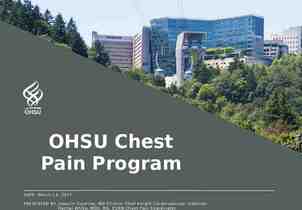Managing Clinical Information: EHR Terms and Architecture Nancy
15 Slides143.19 KB

Managing Clinical Information: EHR Terms and Architecture Nancy Staggers, PhD, RN, FAAN Professor, School of Nursing and Scott Narus, PhD, University of Utah and Intermountain Healthcare, Salt Lake City, UT

Definition EHR, EMR EMR EHR; EMR is not EHR EMR typically more limited in scope EHR (www.himss.org/library/ehr/) E-record of health information Conforms to standards (although some may not) Created, managed, consulted by authorized staff More than one facility (or not) EHR is the most commonly accepted term currently

TERMS Laboratory Information System (LIS) Radiology Information System (RIS) Scheduling, results reporting Usually integrated with PACS Picture Archiving and Communication System (PACS) Specimen processing and management, results Digital Imaging Computerized Provider Order Entry Program to manage and process patients’ orders that includes direct order entry by providers

TERMS Clinical Decision Support System (CDS) is a process for enhancing health-related decisions and actions with pertinent, organized clinical knowledge and patient information to improve health and healthcare delivery. Information recipients can include patients, clinicians and others involved in patient care delivery; information delivered can include general clinical knowledge and guidance, intelligently processed patient data, or a mixture of both; and information delivery formats can be drawn from a rich palette of options that includes data and order entry facilitators, filtered data displays, reference information, alerts, and others. (www.himss.org/library/clinical-decision-support)

EHR Functions Functions Complete longitudinal patient record Clinical documentation, full CDS Closed loop medication administration (the whole process from order to administration) Orders management (CPOE with CDS) Imaging, especially PACS CDR (Clinical Data Repository), HIE (Health Information Exchange) capable Ancillaries – lab, rad, pharm

EMR Adoption Model EMR Adoption ModelSM Stage Cumulative Capabilities Stage 7 Medical record fully electronic; HCO able to contribute CCD as by product of EMR; Data warehousing in use Stage 6 Physician documentation (structured templates), full CDSS (variance & compliance, full R-PACS Stage 5 Closed loop medication administration Stage 4 CPOE, CDSS (clinical protocols) Stage 3 Clinical documentation (flow sheets), CDSS (error checking), PACS available outside Radiology Stage 2 Clinical Data Repository, Controlled Medical Vocabulary, Clinical Data Support System, may have Document Imaging Stage 1 Ancillaries – Lab, Rad, Pharmacy - All Installed Stage 0 All Three Ancillaries Not Installed 2008 HIMSS Analytics, LLC

Infrastructure Master Patient/Person Index (MPI) Identifiers linked to one patient, e.g., age, name. The MPI is the key to integrating data across systems to the correct patient Central Data Repository (CDR) A computer server storing data integrated across applications /systems. Allows retrieval without regard for origin (Hebda & Czar, 2013) Allows real-time data retrieval

Infrastructure Data Dictionary (DD) / Terminology Server Stores standard definitions and terms to allow communication and integration across systems, such as a common definition for myocardial infarction Knowledge Repository (KR) Stores evidence-based knowledge such as guidelines, protocols, etc. Not always a component of current EHRs Continuity Care Document (CCD) Summary of care from many providers to improve care continuity

Infrastructure Interface Engine (IE) Software that allows systems to exchange, integrate and/or share data with each other (Hebda & Czar, 2013) Requires specific communication protocols and shared understanding of terms Allows many to many sharing

TERMS (Enterprise/Clinical) Data Warehouse (EDW or CDW) Extremely large database storing all, or the majority, of an organization’s data. Data may be across clinical, financial and administrative systems Allows off-line searching Used for research, data mining, knowledge discovery, knowledge management

EHR Architecture Complex arrangement of EHR and networking components Networks Hardware and software allowing communication and electronic transfer of information between computers (Hedba & Czar, 2013) Connected by a LAN (local area network) or WAN (wide area network)

Networks, Communication Community Health Information Network (CHIN) or Community Health Information Exchange (CHIE) Network and software to allow members to share information in a specific geographical area Regional Health Information Network (RHIO) aka Regional Health Information Exchange (RHIE) aka Health Information Exchange Same concept as above

EHR Architecture Ancillary Systems EHR 3 EMR 2 CDR EMR 1

EHR Architecture Ancillary Systems KR MPI EHR 3 EMR 2 CDR CDS CDR EMR 1 CCR / CCD DW DD

EHR Architecture HIE Provider X KR MPI Ancillary Systems IE EHR 3 EMR 2 DSS CDR EMR 1 DW CDR DD Security / Firewalls CCR / CCD






